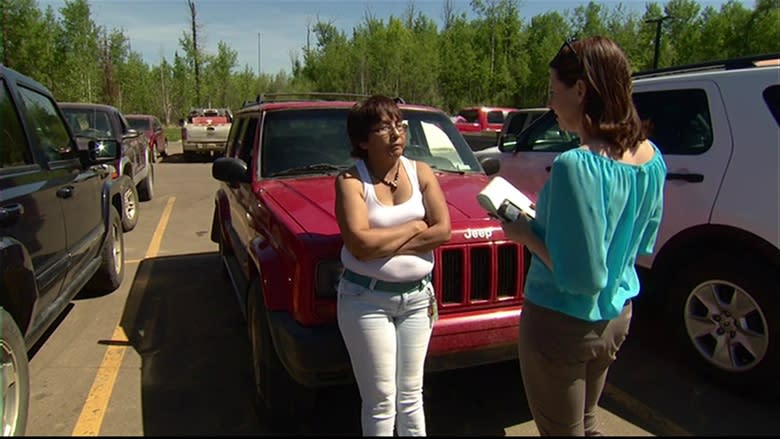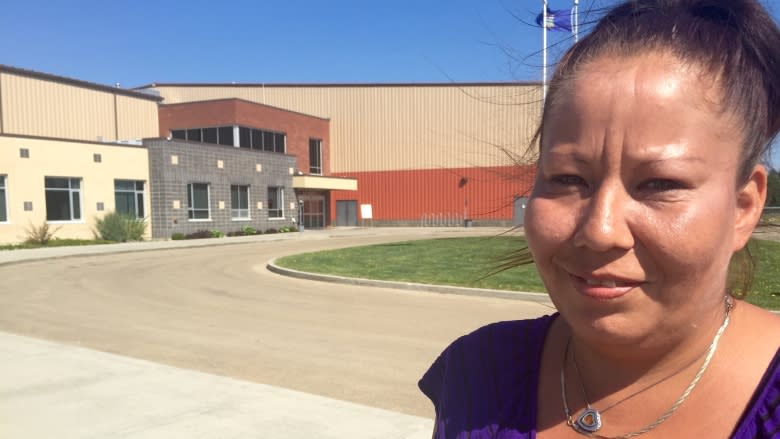Wabasca evacuees flee wildfire, find kindness
Pulling up at a lakeside campsite, CBC videographer Emilio Avalos and I had to remind ourselves why we were there — the tranquil beauty a stark contrast to the chaotic scene you'd expect when wildfire forces thousands to flee.
But this was no holiday.
Campers arriving in Calling Lake, about a 45 minute drive from Wabasca, were exhausted and anxious. They were carrying few belongings but were heavy with the burden of deciding in mere minutes what to take and what to leave behind, possibly for good.
The first evacuee we met had to do what wouldn't be easy for any parent: leaving behind her three adult children. They remained in Wabasca to fight the fire and protect against looting.
Cynthia Young took time out of the routine she'd settled into, texting her children every half hour to make sure they were okay, and introduced us to the 10 or so families camped out.
Among them, the Auger's who had fled their beloved home surrounded by forest. For this family what once brought peace of mind was now creating waves of anxiety with a wildfire the size of 100 football fields, just five kilometres from their home, hungry for new fuel and roaring towards their home.
Helena Auger, 9, was especially worried about her house. It was the first time since moving out of their trailer that she and her brothers all had their own rooms. That's a big thing for a kid. But clearly wise beyond her years, she pointed out that at least her family was safe and together.
It's also where we stumbled upon our first local hero.
Martin Beaver, 51, wore jeans tucked into two-tone cowboy boots, and his eyes crinkled when he smiled.
He is not the kind of guy who you'd ever expect to brag, but his proud family encouraged him to share his story.
Beaver oversees a landfill. Two days earlier someone lit up a van at the dump, he said. Beaver tried to put it out with his wajax.
Okay, for those who don't know what a wajax is — we didn't either. Emilio asked Martin to give us a demonstration. He slung a sac of water over his shoulders, grinning as he squirted water from the long thin tube of his portable fire pump into the sky.
And they had it contained, so the story goes.
"But then my wajax ran out of water, he said.
When asked about the dangers, Martin shrugged it off. After all, he said, he'd been fighting fires since he was 16.
Indeed, living under the threat of wildfire seems to be part of the lifestyle here. Something I was reminded of later that day, arriving at Athabasca's evacuation centre for the second time in my life.
Memories of Slave Lake
Four years ago the recreation centre sheltered hundreds of Slake Lake evacuees — now offering refuge once again.
My mind flashed back to a Sunday night four years ago. Our CBC convoy of two vehicles driving down dark roads until we'd hit yet another road block. Eventually pulling up here.
It was much more chaotic then. A constant influx of vehicles hastily stuffed with photos, keepsakes, clothes and pets as anecdotes of fleeing a town in flames tumbled out of the mouths of the shocked and displaced.
But this time, evacuees weren't in such dire straits. The wildfire only a threat from kilometres away.
Still, the Slake Lake fire wasn't far from people's minds. Especially for Tricia Beaver who was staying at the evacuation centre. Again.
Beaver had moved to Wabasca months earlier from Slave Lake. Back in 2011, she didn't lose her home. She hoped her luck would hold out once again.
And it just so happens that Tricia Beaver, who we met by pure coincidence, IS related to our wajax-wielding hero Martin Beaver. She's his proud-as-can-be niece and even has a firefighting licence.
This week she put it to use.
Turns out, Tricia first spotted that dump fire. Rushed to grab her uncle. With other relatives, they carried pails of water, while trees exploded around them, as Martin used his wajax to battle the flames.
The fire was contained, said Tricia, until the water ran out.
Both Tricia and Martin said the fire then grew into that 200-hectare monster fire that would temporarily chase thousands from their homes.
Of course, we now know the fires this week and four years ago ended very differently. But there are similarities: both brought out the best in people.
In Slake Lake, as the embers cooled and residents returned to search for something of value in the rubble, what lived on were the stories of people's courage and generosity.
Once again, that spirit was on full display this week, as those in Calling Lake and Athabasca tried to make life as comfortable as possible for their displaced neighbours.
Residents opened their doors to strangers, volunteers hopped up on coffee and little sleep lended a hand in whatever way they could and donations — everything from toiletries, and clothes to truckloads of groceries — poured in.
One evacuee, who marvelled at the generosity, told me he just kept thanking everyone.
Kindness overcoming adversity — a memory bound to endure.




